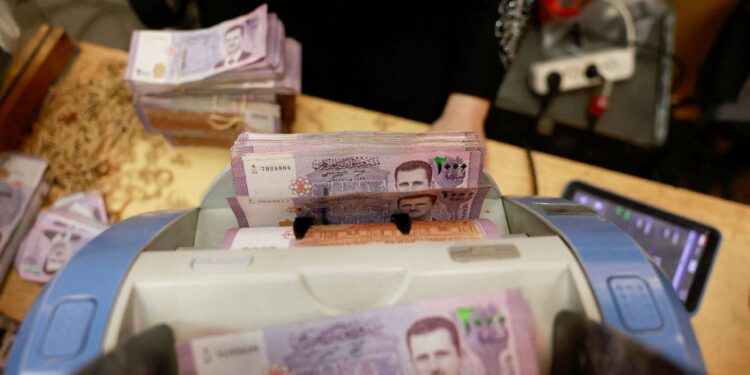12/17/2024–|Last updated: 12/17/202403:54 PM (Mecca time)
The Central Bank of Syria set the exchange rate of the lira at financial institutions and banks at 12,500 lira against the dollar, in the first price bulletin it officially issued since the overthrow of former President Bashar al-Assad on December 8.
Reuters quoted exchange companies in Damascus late last week that the Syrian currency had already risen from 15,000 pounds against the dollar in the last days of Assad’s rule.
Traders attributed the reason to the return of thousands of Syrians who sought refuge in countries abroad during the war and to the open use of the dollar and Turkish currency in the markets.
Several official exchange rates were used during Assad’s rule in exchange companies and for financial transfers from abroad and by United Nations agencies, and there were other rates in the parallel market.
But using foreign currencies in daily business dealings could previously have led to imprisonment, and many Syrians were afraid to even say the word “dollar” in public.
In a bulletin issued yesterday, the Central Bank determined the exchange rate of the lira against several foreign currencies, including the Saudi riyal, the Chinese yuan, and the Russian ruble.
Low reserves
Syria’s caretaker Prime Minister, Muhammad al-Bashir, told Al Jazeera on Tuesday that his country’s foreign currency reserves are very low.
The economic crisis in Syria resulted from the conflict, which lasted for years, Western sanctions and currency scarcity due to reasons including the financial collapse in neighboring Lebanon and the Syrian government’s loss of oil-producing lands in the northeast of the country.
The sharp decline in the value of the lira has pushed most Syrians below the poverty line.
The oil industry, manufacturing industries, tourism, and other major sectors in Syria have been subjected to great pressure, and many segments of the population work in the dilapidated public sector, and the average monthly wages are about 300,000 liras ($24).
The new Syrian government, chosen by the opposition after seizing control of Damascus on December 8 in a lightning attack that toppled 50 years of Assad family rule, says it will raise wages and prioritize improving services.
Reuters reported last week that the government also told business leaders that it would adopt a free market model and integrate Syria into the global economy in a major shift away from decades of corrupt state control.
Gold reserve
Yesterday, 4 informed sources told Reuters that there were about 26 tons of gold in the vaults of the Central Bank of Syria, which is the same amount that was in it when the revolution broke out in 2011, even after the overthrow of former President Bashar al-Assad and his flight to Russia.
But the same sources added that Damascus possesses a small amount of cash from hard currency reserves.
The World Gold Council stated that Syria’s gold reserves amounted to 25.8 tons in June 2011, and the Council referred to the Central Bank of Syria as a source of its data.
Reuters calculations showed that this amount is equal to $2.2 billion at current market prices.



